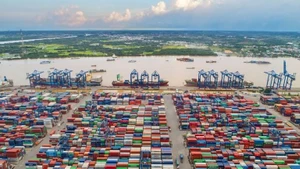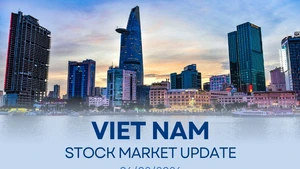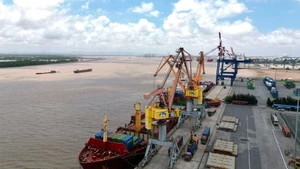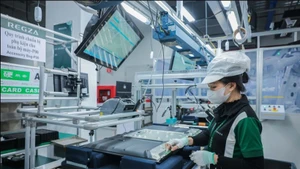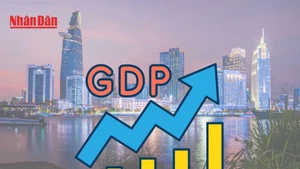Potential for breakthroughs in the transformation period
At the National Innovation Startup Day 2024 held on November 27, Minister of Science and Technology Huynh Thanh Dat assessed that after nearly ten years of development, Vietnam’s innovative startup ecosystem has grown strongly. From a less dynamic startup ecosystem, it has risen to rank 44th out of 133 countries in 2024. Venture capital attraction also grew strongly this year, with venture investment deals climbing 27 places to rank 50th out of 133 countries.
The number of deals receiving venture capital increased by 10 places, reflecting improvements in the investment environment and the quality of innovative startups. These figures show that the innovative startup ecosystem is on a development trajectory and has strong potential for breakthroughs in the transformation period.
The success of the innovative startup ecosystem stems from the efforts of innovative startup businesses and the close guidance of the government, along with synchronised coordination among ministries, agencies, and localities.
The impact of the innovative startup ecosystem is closely tied to the creation of a favourable environment by certain localities for the growth and development of innovative startup companies.
According to the Global Startup Ecosystem Index Report 2024 released by Startup Blink, Hanoi and Ho Chi Minh City have made it into the top 200 global startup cities, while Da Nang has entered the top 1,000 global startup cities for the first time.
The success of these cities lies in their ability to leverage their unique strengths to develop innovative startup ecosystems. With the concentration of many colleges and universities as its strength, Ho Chi Minh City’s key focus has been on effectively connecting universities, research institutes, businesses and the state.
Currently, Ho Chi Minh City is implementing multiple programmes simultaneously, where solutions directly impact the development of scientific research at universities and research institutes. These include programmes supporting business cooperation in research and development with universities; programmes promoting the commercialisation of university research through technology exchange platforms; promoting universities to develop according to the startup university model; and establishing strong research centres.
Hai Phong leverages its advantage of having many corporations and businesses operating in the city, as well as numerous universities, colleges, and vocational schools to provide human resources for businesses and receive assignments from them for startup businesses to research and transfer technology.
Da Nang is preparing comprehensive resources to build and develop its innovative startup ecosystem, such as establishing a startup network coordination council; institutionalising startup support policies, with the principle of making businesses the centre of the startup ecosystem; and supporting technological innovation in businesses.
Furthermore, since the COVID-19 pandemic, Da Nang has been focused on expanding innovation connectivity corridors with Singapore, the Republic of Korea, Japan, Australia, and the United States, which has transformed Da Nang into a place for meetings and calling for investment.
According to Vo Duc Anh, Deputy Director of Da Nang Innovation and Startup Support Centre, with the special mechanism approved by the National Assembly, Da Nang aims to become an innovative city by 2030, serving as a national gateway in the central region to connect innovative startups with the world.
The Ministry of Science and Technology believes that the success of these localities open up opportunities for other localities to apply, learn from, and elevate the national innovative startup ecosystem. Localities need to proactively implement synchronised and effective measures to promote innovative startups in a flexible manner with policies tailored to their local characteristics.
Innovative institutions needed
According to the Ministry of Science and Technology, innovative institutions are needed to promote innovative startups. As the ecosystem has matured and entered a new phase of global expansion and connection, it is necessary to build a policy system that aligns with the nature, scale, potential, and development direction of the ecosystem. Accordingly, a complete and clear legal framework for the startup ecosystem is needed, with regulations on identifying and recognising entities within the ecosystem without confusion with other subjects, so that preferential and support policies can reach the right targets.
Many experts believe that this new development phase needs to feature the emergence of new components — large enterprises — which play a major role in providing assignments for innovative startups to solve, as well as being consumers of solutions and technologies from startup organisations and individuals.
“It is necessary to promote open innovation activities, connecting businesses with innovative startups. If we let startup organisations and individuals continue to develop spontaneously as in the recent period, it will not create a sustainable ecosystem and won’t produce technology unicorns, with no large enterprises to connect with the international ecosystem,” emphasised Deputy Minister of Science and Technology Hoang Minh.
Innovative startup businesses are at the centre of forming a strong national innovative startup ecosystem, and they need to be connected with investment capital resources, advisors, and experts.
According to Nguyen Ba Diep, co-founder and Vice Chairman of Online Mobile Services JSC, the innovative startup model through technology will be a lever helping the government achieve its goals of promoting digital economy development and escaping the middle-income trap.
However, from the development experience of domestic and foreign technology startups, it is clear that for businesses to develop, they need special and long-term support from the government, and industries with potential for growth need to be encouraged and supported for at least ten years. The government can select and allow large startup companies to provide services directly to the government to create a foundation for business market expansion.
An important issue highlighted by startup businesses is that when businesses develop on a large scale, they will need to cooperate with foreigners and overseas Vietnamese. Therefore, the government needs to have practical support policies such as issuing long-term work visas, reducing personal income tax, and arranging accommodation to attract foreign partners.
In addition, support policies are needed to help innovative startups access both domestic and foreign capital sources and raise funds from the public.

